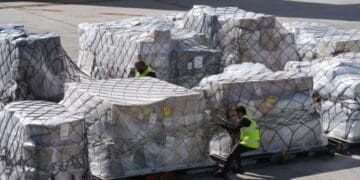Negotiations for a ceasefire in Lebanon have reached an “advanced stage,” Ynet News reported on Tuesday, shortly after IDF officials told Walla that the army had accomplished the military goals of its ground operation in southern Lebanon.
Senior Israeli political officials told Ynet News that negotiations between Israel and Lebanese representatives of Hezbollah have advanced to the degree that White House envoy Amos Hochstein, who has brokered the talks on behalf of the United States, may return to the region even before the U.S. elections on Nov. 5 to try and reach an agreement.
Meanwhile, the IDF’s Northern Command affirmed that its military goals in southern Lebanon have now been reached and is waiting for instructions from the political leadership on how to proceed, Walla News reported.
Most of Hezbollah’s infrastructure near the border, initially intended for a large-scale invasion of Israel, has been destroyed. Additionally, most of the weapons found there have either been removed to Israel or destroyed in the field.
The situation in Lebanon has now “changed from end to end as a result of the actions of the IDF and the security establishment,” and the IDF is expected to begin withdrawing larger portions of its troops, deploying them to strategic locations in Lebanon until a final agreement is reached, according to Ynet.
However, officials emphasized that military operations would continue until an agreement was reached and wouldn’t stop during negotiations. The IDF still has several high-priority targets identified by intelligence that have yet to be attacked.
The sudden progress in negotiations was reportedly approved by the Iranian regime, which permitted – and possibly pressured – Hezbollah to drop its demand that the Gaza War be concluded before agreeing to a ceasefire in Lebanon.
Another factor driving the push for negotiations is the recent jump in IDF casualty numbers , which Lebanese officials say enables Hezbollah to enter talks from a stronger position without appearing to lose face.
If an agreement is reached, Israeli sources say it will start with a 60-day period of “adjustment,” which will be used to examine a monitoring mechanism and allow the Lebanese army to deploy in the south.
If negotiations fail, Walla News reported that the IDF informed the political leadership it could either continue advancing through ground maneuvers and airstrikes or maintain control over territory currently being overseen by the IDF, which would require expanding operational control in several villages.
According to Walla, without a diplomatic agreement, the IDF would need to establish a strategy for maintaining stability in southern Lebanon.
Ynet said the proposed agreement will include three separate components.
The first component is the implementation of UN Resolution 1701 , including the complete withdrawal of Hezbollah forces from southern Lebanon and the deployment of 5,000 to 10,000 soldiers of the Lebanese Armed Forces to control the area.
To support this, the existing UNIFIL peacekeeping force would need to be strengthened.
Israel reportedly contacted France, the United Kingdom and Germany regarding the possibility of reinforcing UNIFIL with several battalions from their troops.
The second component is the creation of an internationally backed enforcement and supervision mechanism, that could be used by all relevant parties to report violations of the agreement.
Israel reportedly agreed with the U.S. that if Hezbollah violated the terms, for example, by building military infrastructure south of the Litani River – and neither the Lebanese army nor UNIFIL took action according to their obligations – Israel would be permitted to remove threats on its own.
The third component is the prevention of the rearming of Hezbollah by defining equipment forbidden from entering the country via air, land and sea.
The report indicated that Israel has been working to enlist additional countries, particularly Russia, to help guarantee the mechanisms of the emerging agreement.
The Russian government has reportedly agreed to assist in the implementation of the agreement and play a role in stabilizing Lebanon and Syria.
“The Russians will have a special status in implementing the agreement and preventing further escalation,” an informed foreign source told Ynet.
Read More









































































